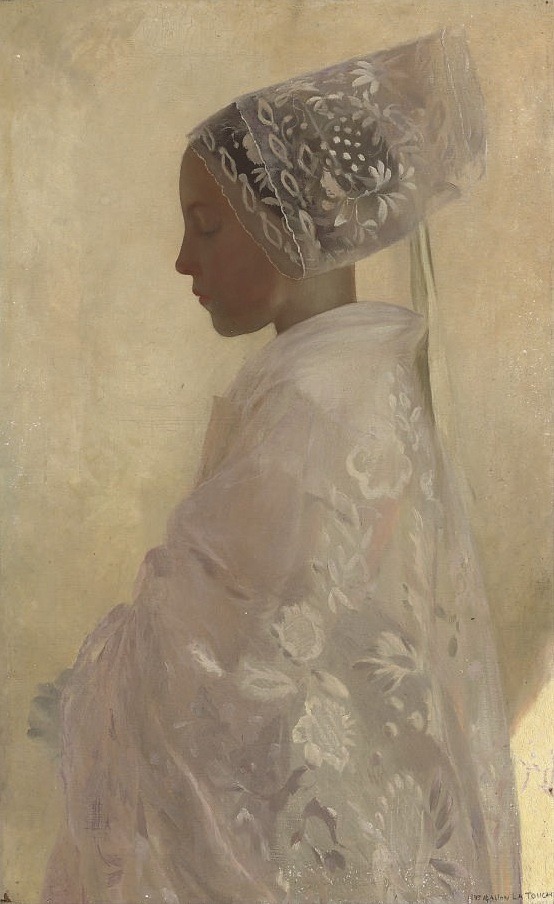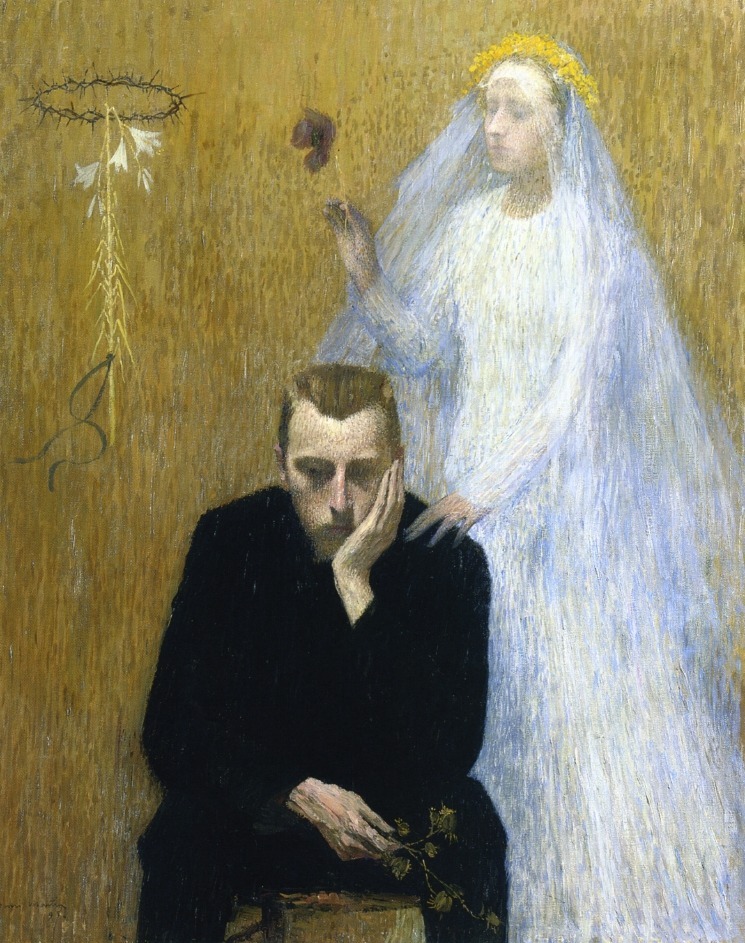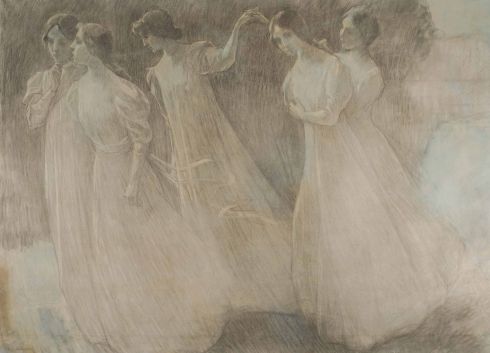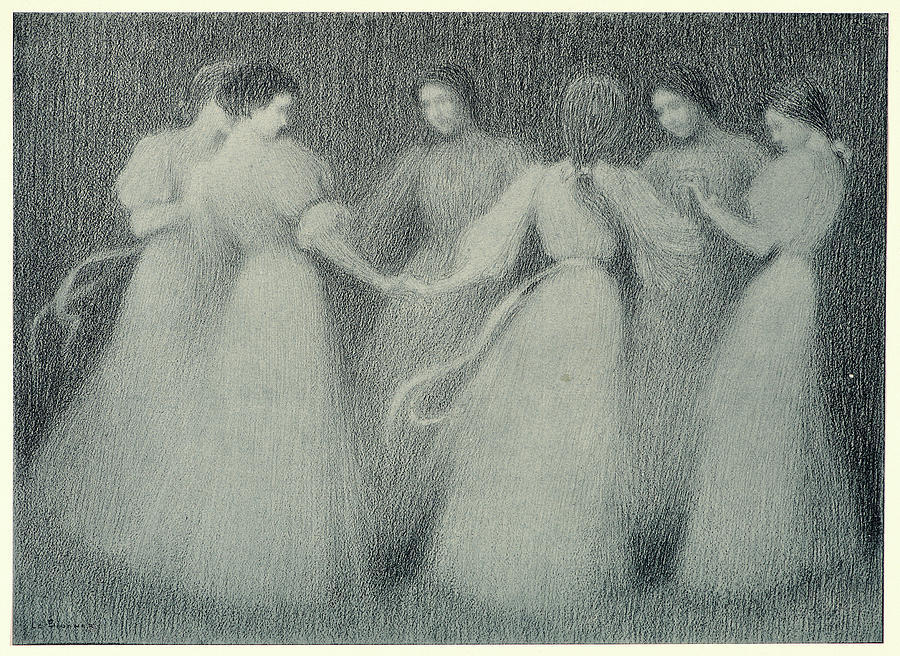“Shameful to say, I was in bed at ten. (…) This morning I am in a sort of temper, indolent and supremely careless—I long after a Stanza or two of Thomson’s Castle of Indolence—my passions are all asleep, from my having slumbered till nearly eleven…”
 James Abbott McNeill Whistler, Symphony in White, No. 3, 1865-67
James Abbott McNeill Whistler, Symphony in White, No. 3, 1865-67
Last night I was reading some of John Keats’ beautiful letters and the one from the 19th March 1819 struck me with its description of sweet indolence – something near and very dear to my heart. Since today is also the 19th of March, I thought it a splendid serendipity that deserves a post. The letter was written during Keats’ stay at Wentworth Place in Hampstead Heath. His stay there, from December 1818 to May 1820, has proven to be quite fruithful, not only in poetry, but also – in love. He wrote five out of his six great odes while there, one of which, surprise surprise, is the “Ode to Indolence”, and fell in love with Fanny Brawne. On that morning of the 19th March, as Keats was enjoying the idleness of early spring in the coziness of his bed, little did he know what was awaiting him around the corner; on the 3rd April that year Fanny Brawne and her mother had moved into the other half of the Wentworth Place and the two were able to spend time together every day, and the months to follow were a fruithful period for him artistically.
Keats writes about staying in bed late, about being indolent, and even though our minds, so poisoned today with the culture of hustle and an emphasis on productivity, may perceive this as a waste of time, it was in fact the opposite. The word “indolence” comes from the Latin word “indolentia”, and even though nowadays the word is almost synonymous with laziness, originally it was meant to describe a state in which one feels free from pain. For many poets of the Keats’ generation and even prior generations, indolence was seen as the first step of artistic creation; indolence as a passive state which precedes the active state of creating an artwork. At the time of writing the letter, Keats had spent two months having written almost nothing, and that might be seen as a waste of time, but the indolence which he allowed himself to experience will prove to be useful later on. Even when you plant the seeds, the flowers don’t start growing instantly, and just because the plant hasn’t sprung it doesn’t mean the soil is dead. Keats’ indolence was merely a period In April and May that year he had written some of his most beautiful and most celebrated poetry. For many poets, indolence was seen as a mood that is auspicious for artistic creation, for a mind that is idle is a fertile ground for flowers to bloom.
“Shameful to say, I was in bed at ten—I mean this morning. (…) This morning I am in a sort of temper, indolent and supremely careless—I long after a Stanza or two of Thomson’s Castle of Indolence—my passions are all asleep, from my having slumbered till nearly eleven, and weakened the animal fibre all over me, to a delightful sensation, about three degrees on this side of faintness. If I had teeth of pearl and the breath of lilies I should call it languor, but as I am I must call it laziness. In this state of effeminacy the fibres of the brain are relaxed in common with the rest of the body, and to such a happy degree that pleasure has no show of enticement and pain no unbearable power. Neither Poetry, nor Ambition, nor Love have any alertness of countenance as they pass by me; they seem rather like figures on a Greek vase—a Man and two women whom no one but myself could distinguish in their disguisement. This is the only happiness, and is a rare instance of the advantage of the body overpowering the Mind.”
Still, in the same letter, upon having heard news about his friend’s dying father, he laments on the transient nature of the pleasures of life. All the more reason to cherish them then:
“This is the world—thus we cannot expect to give way many hours to pleasure. Circumstances are like Clouds continually gathering and bursting—While we are laughing, the seed of some trouble is put into the wide arable land of events—while we are laughing it sprouts it grows and suddenly bears a poison fruit which we must pluck.”
In a letter to John Hamilton Reynolds, from the 19th February 1818, Keats writes again about the “beauty of the morning” and a “sense of Idleness”. It seems that Keats had quite a few indolent mornings which he definitely benefited from artistically:
“It has been an old comparison for our urging on – the Beehive; however, it seems to me that we should rather be the flower than the Bee – for it is a false notion that more is gained by receiving than giving – no, the receiver and the giver are equal in their benefits. The flower, I doubt not, receives a fair guerdon from the Bee – its leaves blush deeper in the next spring – and who shall say between man and woman which is the most delighted? Now it is more noble to sit like Jove than to fly like Mercury – let us not therefore go hurrying about and collecting honey, bee-like buzzing here and there impatiently from a knowledge of what is to be aimed at; but let us open our leaves like a flower and be passive and receptive – budding patiently under the eye of Apollo and taking hints from every noble insect that favours us with a visit – sap will be given us for meat and dew for drink. I was led into these thoughts, my dear Reynolds, by the beauty of the morning operating on a sense of Idleness…“
















